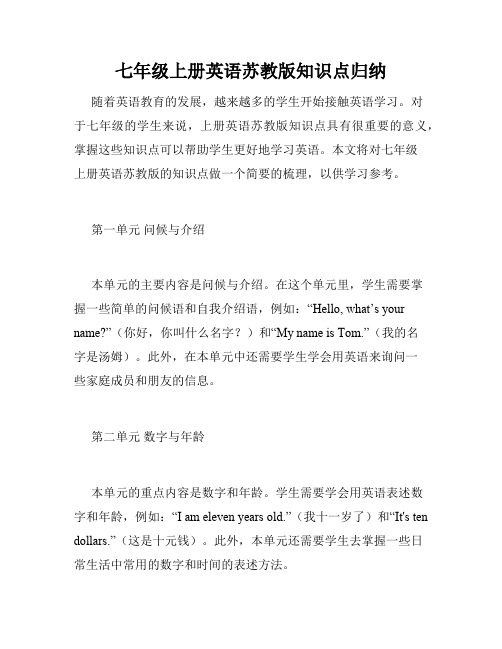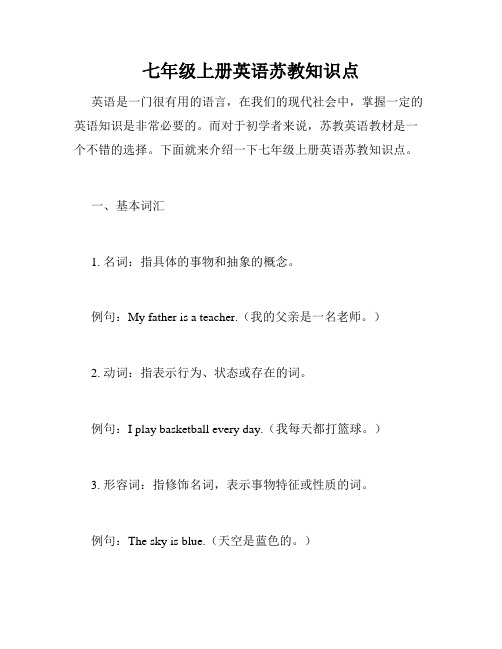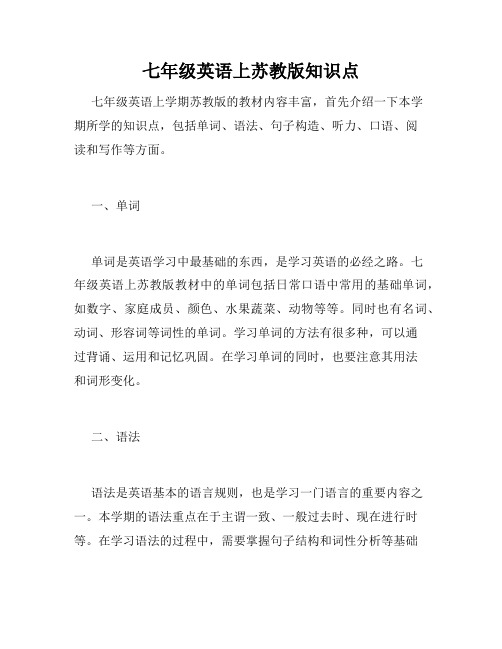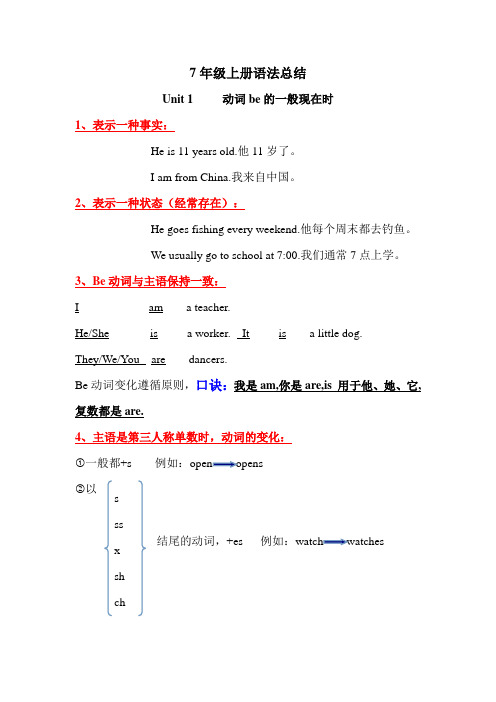七年级上册英语(苏教版七年级)7AU4 Grammar知识点
七年级上册英语(苏教版七年级)7AU4 Reading知识点

7AU4 Reading知识点一.复习:1. Our school starts at 7:00 a.m..2. Our first class begins at 7:45.3. We usually do morning exercises at about 8:45.4. After lunch, we often chat with each other (in front of the classroom).5. We often have lunch at school at noon.6. When do you usually do eye exercises?7. How many lessons do you usually have in the morning?8. What do you think of …?9. We learn a lot from each other.10. It’s time to get up.二.词组1.一个阳光中学的学生2.在早上8点钟开始3.从周一到周五4.先做早操5.我最喜欢的科目6.有许多的朋友7.对我很好8.相互聊天9.在操场上玩10.去图书馆11.有一个阅读俱乐部12.在那儿读书13.在星期二和星期四14.在学校排球队15.在放学后练习16.过得开心三.知识点1. Usually we do morning exercises first.first (1) adv. 首先Don’t talk about it now. Let’s have lunch first.(2) adj. 第一的第一堂课7点45开始。
Our ____ class begins at 7:45a.m.他总是第一个到学校最后一个离校。
He is always the first to come to school and the last to leave school.我的启蒙老师my first teacher 第一夫人the first lady2. Our lessons begin at 8:15.= We begin/ start our lessons at 8:15.3. My favourite subject is English. =English is my favourite subject. = l like English best.4. I am good at it (English). =I do well in it. = I study it well.5. They are all nice to me.他们都对我很好。
七年级上册英语苏教版知识点归纳

七年级上册英语苏教版知识点归纳随着英语教育的发展,越来越多的学生开始接触英语学习。
对于七年级的学生来说,上册英语苏教版知识点具有很重要的意义,掌握这些知识点可以帮助学生更好地学习英语。
本文将对七年级上册英语苏教版的知识点做一个简要的梳理,以供学习参考。
第一单元问候与介绍本单元的主要内容是问候与介绍。
在这个单元里,学生需要掌握一些简单的问候语和自我介绍语,例如:“Hello, what’s your name?”(你好,你叫什么名字?)和“My name is Tom.”(我的名字是汤姆)。
此外,在本单元中还需要学生学会用英语来询问一些家庭成员和朋友的信息。
第二单元数字与年龄本单元的重点内容是数字和年龄。
学生需要学会用英语表述数字和年龄,例如:“I am eleven years old.”(我十一岁了)和“It's ten dollars.”(这是十元钱)。
此外,本单元还需要学生去掌握一些日常生活中常用的数字和时间的表述方法。
第三单元学校生活本单元的内容主要涉及学校和日常生活。
学生需要学会简单的表述学校的各种设施和建筑,例如:“That’s the classroom.”(那是教室)。
同时,本单元还需要学生学会一些简单的描述自己日常生活的词汇和句型,例如:“I usually watch TV in the evening.”(我通常晚上看电视)。
第四单元家庭与朋友本单元的内容主要涉及到家庭和朋友。
学生需要学会用英语介绍自己的家庭和朋友,例如:“This is my father, he is a doctor.”(这是我的爸爸,他是一名医生)。
此外,在本单元中还需要学生学习一些关于朋友和家庭的表述,例如:“My best frien d is Lucy.”(我的最好的朋友是露西)。
第五单元食品与饮料本单元的重点是关于食品和饮料的相关知识。
学生需要学会用英语表述一些常见的食品和饮料,例如:“I like pizza.”(我喜欢比萨饼)和“Do you want some water?”(你想要一些水吗?)。
七年级上册英语苏教知识点

七年级上册英语苏教知识点英语是一门很有用的语言,在我们的现代社会中,掌握一定的英语知识是非常必要的。
而对于初学者来说,苏教英语教材是一个不错的选择。
下面就来介绍一下七年级上册英语苏教知识点。
一、基本词汇1. 名词:指具体的事物和抽象的概念。
例句:My father is a teacher.(我的父亲是一名老师。
)2. 动词:指表示行为、状态或存在的词。
例句:I play basketball every day.(我每天都打篮球。
)3. 形容词:指修饰名词,表示事物特征或性质的词。
例句:The sky is blue.(天空是蓝色的。
)4. 副词:修饰动词、形容词和其他副词,表示时间、地点、程度、方式等。
例句:She runs fast.(她跑得很快。
)5. 介词:用于连接名词或代词与其他词汇,表示表示时间、地点、状态、方式等。
例句:I live in Shanghai.(我住在上海。
)二、语法1. 简单句和复合句:简单句是只有一个主语、一个谓语的句子,复合句有两个或以上的主谓结构。
例句:- My brother is a student.(我哥哥是一名学生。
)【简单句】- He is tall and he has short hair.(他很高,但头发很短。
)【复合句】2. 时态:表示动作发生的时间。
例句:- I am studying English now.(我正在学英语。
)【现在进行时】- She will go to Beijing next month.(她下个月会去北京。
)【一般将来时】3. 疑问句:用来询问事情的话语,一般以疑问词引导。
例句:- What's your name?(你叫什么名字?)- Where do you live?(你住在哪里?)4. 直接引语和间接引语:表示直接或间接引用他人或自己的话语。
例句:- She said, "I like music."(她说:“我喜欢音乐。
七年级英语上苏教版知识点

七年级英语上苏教版知识点七年级英语上学期苏教版的教材内容丰富,首先介绍一下本学期所学的知识点,包括单词、语法、句子构造、听力、口语、阅读和写作等方面。
一、单词单词是英语学习中最基础的东西,是学习英语的必经之路。
七年级英语上苏教版教材中的单词包括日常口语中常用的基础单词,如数字、家庭成员、颜色、水果蔬菜、动物等等。
同时也有名词、动词、形容词等词性的单词。
学习单词的方法有很多种,可以通过背诵、运用和记忆巩固。
在学习单词的同时,也要注意其用法和词形变化。
二、语法语法是英语基本的语言规则,也是学习一门语言的重要内容之一。
本学期的语法重点在于主谓一致、一般过去时、现在进行时等。
在学习语法的过程中,需要掌握句子结构和词性分析等基础知识,同时要不断地进行语法练习,为写作和口语提供坚实的基础。
三、句子构造句子构造是指在语法的基础上,运用各种句子成分和句型对语言进行组合的能力。
本学期的重点在于基本的句型和句子成分。
需要学习的有简单句、复合句、并列句以及句子成分如主语、谓语、宾语、定语、状语等。
在学习句子构造的过程中,还需要注意句子的语法和逻辑关系,以及准确表达意思。
四、听力听力是学习英语的一个重要方面,也是语言表达和交流的基础。
在英语学习中,通过听力可以提高语音、语调的准确性,培养语感,灵活应对实际场合的语言沟通。
在本学期中,通过听力训练,可以学习到基本的语音、发音、语调、语速和口号等。
五、口语口语是英语学习的重要组成部分,也是全面学习英语的必要条件之一。
通过口语训练,可以提高口语表达能力和交流沟通的能力。
在听说训练中,要注重获取语言的流畅性、正确性、准确性和连贯性。
六、阅读阅读是学习英语的重要方式之一,也是提高英语综合技能的重要途径。
本学期的阅读内容包括基础阅读和扩展阅读。
通过阅读可以扩大词汇量,熟悉英语常用词汇和表达方式,并测试语法和句子结构等。
同时,还可以提高写作和口语表达能力,锻炼语言思维能力。
七、写作写作是英语学习的一个重要方面,也是提高语言综合水平的有效方法。
(完整版)苏教版新译林英语7年级上册语法总结

7年级上册语法总结Unit 1 动词be 的一般现在时1、表示一种事实:He is 11 years old.他11岁了。
I am from China.我来自中国。
2、表示一种状态(经常存在):He goes fishing every weekend.他每个周末都去钓鱼。
We usually go to school at 7:00.我们通常7点上学。
3、Be 动词与主语保持一致: I am a teacher.He/She is a worker. It is a little dog. They/We/You are dancers.Be 动词变化遵循原则,口诀:我是am,你是are,is 用于他、她、它,复数都是are.4、主语是第三人称单数时,动词的变化: ①一般都+s 例如:②以结尾的动词,+es 例如:watch watchessssxshch③ 辅音字母+y 结尾的动词,ies 例如:④辅音字母+o 结尾的动词,+es 例如:goes5、一般现在时的句型转换 ①否定句be+notShe is in the kitchen.~She is not in the kitchen.They are in the classroom.~They are not in the classroom. ②一般疑问句be 提前She is in the kitchen.~Is she in the kitchen?——Yes ,she is. ——No ,she isn ’t. They are in the classroom.~Are they in the classroom ? ——Yes ,they are. ——No ,they aren ’t.Unit 2 行为动词的一般现在时1、行为动词形式变化2、句型转换①否定句:do+not/does +notYou don’t go to school on Sunday.He doesn’t work in this shop.②句首添加do/doesDo you play basketball after school?Does John speak Chinese?Unit 3 人称代词1、我们常用人称代词表示人或物2、人称代词主格、宾格形式3、主格在句中做主语,一般用在动词前宾格在句中做宾语,一般用在动词、介词后4、有好几个人称代词并列出现时,顺序如下:单数:231原则——you、he and I复数:123原则——we、you and theyUnit 4 表示时间的介词in、on、at频度副词:always>usually>often>sometimes>seldom>neverUnit 5 特殊疑问句注意:when和what time的区别What time询问的是具体时间,when可以是具体时间也可以是大体时间。
七年级上册英语苏教版u7知识点

七年级上册英语苏教版u7知识点七年级上册英语苏教版u7共分为三个小节,分别是Unit 7 What do you want?、Unit 8 I'd like some noodles and Unit 9 What would you like?Unit 7 What do you want?1.句型➀:What do you want?(你想要什么?)回答:I want...(我想要...)。
2.句型➁:What would you like?(你想要什么?)回答:I'd like...(我想要...)。
3.句型➂:Can I help you?(我能帮你什么吗?)回答:Yes,please。
I want...(是的,请给我...)。
4.常用词汇:hamburger/sandwich/chicken/noodles/pizza/pasta5.实用日常用语:A: What do you want?(你想要什么?)B: I'd like a hamburger,please。
Thanks.(我想要一个汉堡包,谢谢。
)A: Can I help you?(请问你要点什么?)B: Yes,please。
I want some pizza。
(好的,我想要一些比萨饼。
)Unit 8 I'd like some noodles1.句型➀:I'd like...(我想要...)2.句型➁:What kind of noodles would you like?(你想要什么样的面条?)3.句型➂:Anything else?(还要点别的吗?)回答:No,that's all。
(不要了,就这些。
)4.常用词汇:noodles/rice/noodle soup/vinegar/pork/vegetables5.实用日常用语:A: I'd like some beef noodle soup,please。
七年级上册英语(苏教版七年级)7AU4 My Day 知识点

7AU4 My Day 知识点一.知识点1. wake up 醒来,叫醒把米莉叫醒wake up Millie = wake Millie up 把我叫醒wake me up妈妈每天早早把我叫醒。
Mum wakes me up early every day.我不想叫醒你。
I don’t want to wake you up.不要叫醒那个婴儿,他要哭的。
Don’t wake up the baby. He will cry.2. Is it time for breakfast? 早餐时间到了吗?It’s time for sth.= It’s time to do sth.做……的时间到了。
上课/上学/睡觉/午饭/开会时间到了。
It’s time to have classes. = It’s time for class.It’s time to go to school.=It’s time for school.It’s time to go to sleep/bed.=It’s time for sleep.It’s time to have lunch. = It’s time for lunch. It’s time to have the meeting. = It’s time for the meeting.It’s time for sb. to do sth. 某人该干某事了。
我们该吃晚饭了。
It’s time for us to have supper.他们该上课了。
It’s time for them to have classes/lessons.实用文档你该擦黑板了。
It’s time for y ou to clean the blackboard.3. Shall we go walking in the hills? 我们去山上散步,好吗?Shall we + do …? (=Let’s do sth, shall we?) 是一个表示提出建议的句型(=What about doing sth?= How about doing sth?=Why not do sth?=Why don’t you do sth?)Shall we go to the cinema tomorrow? Shall we play basketball this afternoon?go shopping/swimming/running/fishing4. seldom 很少,不常(adv ) ,表示否定seldom : not (very) often Tom seldom goes to school.never 从不,绝不我上学从不迟到。
七年级上册英语(苏教版七年级)7AU4-Grammar知识点

7AU4 Grammar知识点一.介词用法1) at 1. 在钟点时间前 2.在一日三餐前 3.在无day的节日前 4.在具体年龄前2)on 1.在星期名称前 2.在某月某日前 3.在某月某日的早中晚前 4.在有day的节日前3)in 1.在一天早中晚前 2.在月份前 3.在年份前 4.在季节前注意:不用介词的情况:1. 今天,明天,昨天today, tomorrow, yesterday; tomorrow morning, yesterday evening 等2. 含有this, every, next, last 加时间的短语this week, every day, every afternoon, next month, last year 等二.频率副词在句中的位置:1. 频率副词用在be动词后。
It is usually hot in summer. 夏天天气通常是热的。
2. 频率副词用在主要动词前。
My father usually walks home. 我的父亲经常步行回家。
3. 频率副词用在助动词与主要动词之间。
I will always love you. 我将永远爱你。
三.练习(一) 填入适当的介词:1. It is a good idea to go for a walk ____ a sunny morning.2. I don’t have a party ____ this week.3. He always goes to the library ____ Mondays.4. We’ll have one party ____ next week.5. The story happened _____ a cold winter morning.6. My friends give me some presents _____ Christmas every year.7. The winter holiday is ____ January. My birthday is ___ January 11th.8. My mother gives me lots of presents ___ my birthday.9. We have a rest ____ every Sunday.10. ___ Sunday evening, we will also have a party.11. Children like flying kites ___ spring.12. He got the Nobel Price ____ 37.13. People eat rice dumplings ____ Dragon Boat Festival.14. He was born in a small city ___ 1992.15. He likes watching news ___ TV ____ breakfast.16. ____ National Day, we celebrate in many ways.17. He meets his friend ____ a cold winter morning.18. They play the game ________ the evening of 31st October.(二)按要求改变句子:1.She often goes to the Reading Club.(划线提问)does she go to the Reading Club ?2.He seldom takes a taxi to go to school.(划线提问)_____ ____ ______he _____ a taxi to go to school?3.We play badminton every day.(划线提问)______ _______ _______ ______ play badminton?4. Eddie walks to his bowl many times a day. (划线提问)____ _____ ______ Eddie ______ to his bowl?四.知识点1. age 年龄What’s your age?= How old are you?My age is 14. = I’m 14 (years old).at the age of …在……岁时at the age of 6 = at 6 years old = at 6=at age 6= at age six2. life (pl.) lives knife---knivesI would like/want to tell you about my life here.live a happy life 过着幸福的生活He always lives a happy life.精选3. have lots of fun = have great fun4. Sandy does not have much time to play tennis.have time to do sth. 有时间做某事=have time for sthhave no time to do sth.没有时间做某事我有时间等他。
- 1、下载文档前请自行甄别文档内容的完整性,平台不提供额外的编辑、内容补充、找答案等附加服务。
- 2、"仅部分预览"的文档,不可在线预览部分如存在完整性等问题,可反馈申请退款(可完整预览的文档不适用该条件!)。
- 3、如文档侵犯您的权益,请联系客服反馈,我们会尽快为您处理(人工客服工作时间:9:00-18:30)。
7AU4 Grammar知识点
一.介词用法
1) at 1. 在钟点时间前 2.在一日三餐前 3.在无day的节日前 4.在具体年龄前
2)on 1.在星期名称前 2.在某月某日前 3.在某月某日的早中晚前 4.在有day的节日前
3)in 1.在一天早中晚前 2.在月份前 3.在年份前 4.在季节前
注意:不用介词的情况:
1. 今天,明天,昨天today, tomorrow, yesterday; tomorrow morning, yesterday evening 等
2. 含有this, every, next, last 加时间的短语this week, every day, every afternoon, next month, last year 等二.频率副词在句中的位置:
1. 频率副词用在be动词后。
It is usually hot in summer. 夏天天气通常是热的。
2. 频率副词用在主要动词前。
My father usually walks home. 我的父亲经常步行回家。
3. 频率副词用在助动词与主要动词之间。
I will always love you. 我将永远爱你。
三.练习
(一) 填入适当的介词:
1. It is a good idea to go for a walk ____ a sunny morning.
2. I don’t have a party ____ this week.
3. He always goes to the library ____ Mondays.
4. We’ll have one party ____ next week.
5. The story happened _____ a cold winter morning.
6. My friends give me some presents _____ Christmas every year.
7. The winter holiday is ____ January. My birthday is ___ January 11th.
8. My mother gives me lots of presents ___ my birthday.
9. We have a rest ____ every Sunday.
10. ___ Sunday evening, we will also have a party.
11. Children like flying kites ___ spring.
12. He got the Nobel Price ____ 37.
13. People eat rice dumplings ____ Dragon Boat Festival.
14. He was born in a small city ___ 1992.
15. He likes watching news ___ TV ____ breakfast.
16. ____ National Day, we celebrate in many ways.
17. He meets his friend ____ a cold winter morning.
18. They play the game ________ the evening of 31st October.
(二)按要求改变句子:
1.She often goes to the Reading Club.(划线提问)
does she go to the Reading Club ?
2.He seldom takes a taxi to go to school.(划线提问)
_____ ____ ______he _____ a taxi to go to school?
3.We play badminton every day.(划线提问)
______ _______ _______ ______ play badminton?
4. Eddie walks to his bowl many times a day. (划线提问)
____ _____ ______ Eddie ______ to his bowl?
四.知识点
1. age 年龄What’s your age?= How old are you?My age is 14. = I’m 14 (years old).
at the age of …在……岁时
at the age of 6 = at 6 years old = at 6=at age 6= at age six
2. life (pl.) lives knife---knives
I would like/want to tell you about my life here.
live a happy life 过着幸福的生活He always lives a happy life.
3. have lots of fun = have great fun
4. Sandy does not have much time to play tennis.
have time to do sth. 有时间做某事=have time for sth
have no time to do sth.没有时间做某事
我有时间等他。
I have some time to wait for him.
Tom每天有很多的作业,所以他没有时间玩电脑游戏。
Tom has a l ot of homework every day, so Tom doesn’t have much time to play computer games.
5. Kitty goes to the dancing lessons.
dancing lessons 舞蹈课go to the dancing lessons 去上舞蹈课have dancing lessons 上舞蹈课
have swimming lessons have drawing lessons have reading lessons
write an email to sb. 写email给某人= email sb.
6. How often do you exercise? Once / Twice / Three times a week.
how often意为“多久一次”,表示动作的频率,对它的回答通常用always, usually, often, sometimes, seldom, never, once a week, three times a year等状语。
How often do you go shopping? Once a month.
He seldom writes an email to his parents.(画线提问)How often does he write an email to his parents?
My mother goes to the supermarket three times a month.
How many times does your mother go to the supermarket a month?
My mother goes to the supermarket three times a month. How often does your mother go to the supermarket?
与how有关的
1). How are you? I’m fine. / I’m not well.
2). How old is he? He is only 4 (years old).
3). How does he look ? He looks very young.
4). How does your father go to work? He drives to work. / He goes to work by car. / He goes to work in his car.
5). How long does it take you to go to school every day? Twenty minutes.
6). She dances for half an hour. How long does she dance?
五.词组:
1. 植树
2.在三月份
3.第22届世界杯
4.在2022年
5.我们的暑假/寒假
6.在星期天的早上
7.玩的很开心8.在儿童节那一天
9.在六岁的时候10.告诉你关于我在这儿的生活
11.举行一次学校足球比赛12.每天
13.在七月一日14.谢谢你的email。
15.有时间做某事16.游泳队的一员
17.去上舞蹈课18.跳半个小时的舞
19.去溜旱冰。
